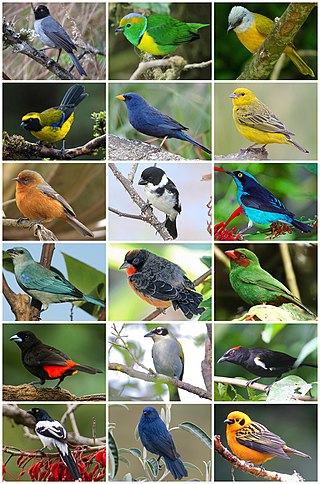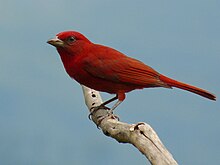
Cardinalidae is a family of New World-endemic passerine birds that consists of cardinals, grosbeaks, and buntings. It also includes several other genera such as the tanager-like Piranga and the warbler-like Granatellus. Membership of this family is not easily defined by a single or even a set of physical characteristics, but instead by molecular work. Among songbirds, they range from average-sized to relatively large, and have stout features, some species with large, heavy bills.

The tanagers comprise the bird family Thraupidae, in the order Passeriformes. The family has a Neotropical distribution and is the second-largest family of birds. It represents about 4% of all avian species and 12% of the Neotropical birds.

The summer tanager is a medium-sized American songbird. Formerly placed in the tanager family (Thraupidae), it and other members of its genus are now classified in the cardinal family (Cardinalidae). The species's plumage and vocalizations are similar to other members of the cardinal family.

The red-crowned ant tanager is a medium-sized passerine bird from tropical America. The genus Habia was long placed with the tanagers (Thraupidae), but it is actually closer to the cardinals (Cardinalidae). Consequently, it can be argued that referring to the members of this genus as ant-tanagers is misleading, but no other common name has gained usage.

The flame-colored tanager, formerly known as the stripe-backed tanager, is a medium-sized American songbird in the family Cardinalidae, the cardinals or cardinal grosbeaks. It is found from Mexico throughout Central America to northern Panama and occasionally in the United States; four subspecies are recognized. The flame-colored tanager is 18 to 19 cm long, the male having predominantly red-orange while the female is more yellowish orange.

The black-backed grosbeak is a bird in the family Cardinalidae, the cardinals or cardinal grosbeaks. It is found in Argentina, Brazil, Bolivia, Colombia, Ecuador, Paraguay, Peru, and Venezuela. They are often kept as cagebirds.

The hepatic tanager is a medium-sized American songbird. Formerly placed in the tanager family (Thraupidae), it and other members of the genus Piranga are now classified in the cardinal family (Cardinalidae).

The red-and-black grosbeak is a species of bird in the family Cardinalidae, the cardinals or cardinal grosbeaks. It is found in Brazil, French Guiana, Guyana, Suriname, and Venezuela.

The plushcap is a species of bird in the tanager family Thraupidae and it is the only member of the genus Catamblyrhynchus.

Carmiol's tanager is a species of bird in the cardinal family Cardinalidae that is found in Central America from Nicaragua southwards to northwest Colombia. Its natural habitats are subtropical or tropical moist lowland forests and heavily degraded former forest. It was formerly considered as conspecific with the yellow-lored tanager.

The grey-hooded bush tanager is a species of South American bird in the tanager family Thraupidae. It is the only member of the genus Cnemoscopus. It is found in Bolivia, Colombia, Ecuador, Peru, and Venezuela. Its natural habitat is subtropical or tropical moist montane forests.

The red-headed tanager is a medium-sized American songbird in the family Cardinalidae, the cardinals or cardinal grosbeaks. It is endemic to Mexico. The red-headed tanager is around 15 cm (5.9 in) long, the male has predominantly yellow-olive plumage with a red head and throat, while the female has a yellowish forecrown.

The white-winged tanager is a medium-sized American songbird in the family Cardinalidae, the cardinals or cardinal grosbeaks. It is found from Mexico, through Central America, across northern South America and as far south as Bolivia.

The rose-throated tanager is a medium-sized songbird in the family Cardinalidae, the cardinals or cardinal grosbeaks. Endemic to the Yucatán Peninsula in Central America, it is found in Belize, Guatemala, and Mexico. The male has greyish plumage with a deep rose throat and crown, while the female is similar but for a yellow crown and throat.

The red-hooded tanager, is a medium-sized American songbird in the family Cardinalidae, the cardinals or cardinal grosbeaks. It is found in Colombia, Ecuador, and Peru.

The orange-headed tanager is a species of bird in the family Thraupidae. Native to South America, it is found in Argentina, Bolivia, Brazil, Colombia, Ecuador, Paraguay, Peru, and Venezuela, where it inhabits successional vegetation, cerrado, riparian forest, shrub, brush, and open woodland. Males of the species have sandy-gray upperparts, cinnamon to buff underparts, white on the center of the lower breast, belly, and tail, and rufous-orange and yellow heads. Females are similar but duller.

The Amazonian grosbeak or Rothschild's grosbeak is a species of grosbeak in the family Cardinalidae, the cardinals or cardinal grosbeaks. It is found in much of the Amazon Basin, in Bolivia, Brazil, Colombia, French Guiana, Guyana, Peru, Suriname, and Venezuela.

The yellow-lored tanager, also known as the olive tanager, is a species of bird in the cardinal family Cardinalidae that is found in South America along the eastern foothills of the Andes from southern Colombia to western Bolivia. It was formerly considered to be conspecific with Carmiol's tanager of Central America.

The red tanager is a medium-sized American songbird in the family Cardinalidae.




















